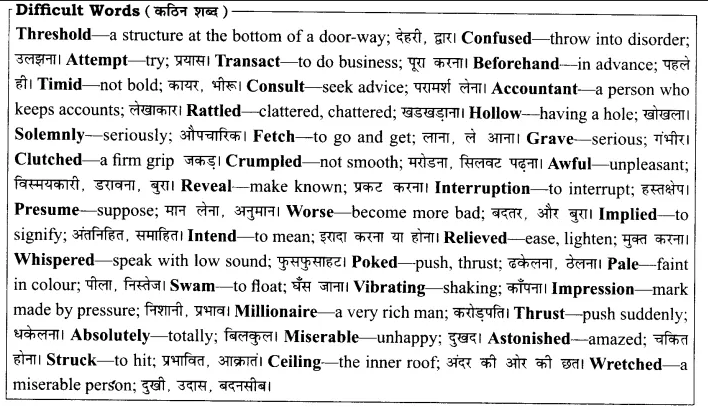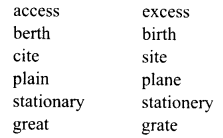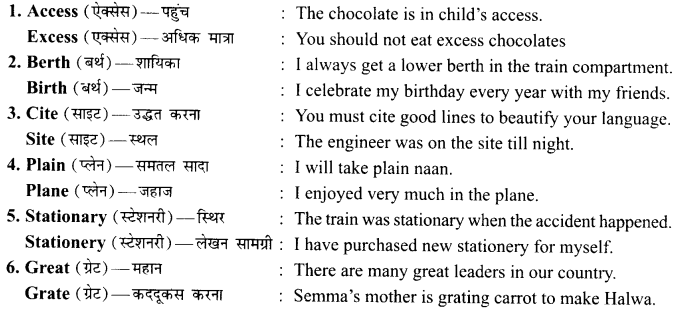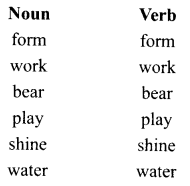Are you pursuing class 8 and seeking for the English RBSE Solutions PDFs? You have stepped into the correct place. Here we have given RBSE Rajasthan Board Solutions for Class 8 English Chapter 11 My First Visit to Bank Questions and Answers. So, students can make use of this RBSE Solutions for Class 8 English Chapter 11 My First Visit to Bank Pdf at any time and anywhere for better preparation. After practicing all the questions from Rajasthan Board Solutions, you’ll definitely crack the class 8 English board exams with high scores.
Rajasthan Board Solutions for Class 8 English Chapter 11 My First Visit to Bank
RBSE Solutions for Class 8 English Chapter 11 My First Visit to Bank Questions and Answers are designed by the subject experts based on the latest syllabus. Students can access all Chapter 11 My First Visit to Bank topics preparation material like Rajasthan Board Solutions for Class 8 English online from the links available over here & ace up your preparation.
Summary of the Lesson
This chapter is about writers confusion about all the activities that are performed in the bank. As he got a raise in his salary, he thought that bank would be the best place to deposit that extra amount every month. So he goes to the bank for opening an account, where he gets confused with the very sight of all the windows in the bank. Still he moves to the ‘Accountant’ window and asks if he could meet the manager because the writer thought that manager will open the account.
The way writer behaved forced the manager to think that he is a C.I.D officer or son of Tata or Birla. But when manager came to know that he will be depositing a small amount of rupees two hundred only every month, he called the accountant to help the writer. The accountant took him to the place where the account opening process was to be done. They asked the writer to fulfill some formalities which made the writer confused and pale. When the whole process of opening the account was over, the writer thought of withdrawing some amount. He was sent to the other person for this purpose.
In confusion, the writer had written the same amount in the cheque what he had deposited in the account. The person on that window was very surprised but the writer insisted that he wanted to withdraw the whole amount. The clerk got astonished. He asked the writer that then why did he open the account even. The clerk asked the writer about the denomination in which he would like to take his money back. When the money was given to the writer and as he left, the writer heard a roar of laughter from inside the bank. And after that the writer never went to the bank for any transaction. He kept his money with himself only.
पाठ का सार
यह पाठ लेखक की घबराहट के बारे में है जो उसे बैंक में घुसते ही सभी गतिविधियों को देखकर होती है। उसकीतनख्वाह में वृद्धि हुई थी, इसलिए उसने सोचा कि बैंक से बेहतर जगह कौन सी होगी जहां वह अपना बड़ा हुआ पैसा हर महीने सुरक्षित रख सके। वह बैंक में खाता खुलवाने जाता है जहां इतनी सारी खिड़कियां देखर घबरा जाता है। तब वह ‘लेखाकार’ वाली खिड़की पर जाकर प्रबंधक से मिलने की बात करता है। वह प्रबंधक से इसलिए मिलना चाहता था क्योंकि उसे लगता था कि वही उसका खाता खोलेंगे। लेखक के अजीब से व्यवहार को देखकर प्रबंधक उसे ब्ण्ण्ण्क अफसर अथवा टाटा बिरला का पुत्र समझने लगते हैं।
मगर जब प्रबंधक को पता चलता है कि वह खाता खुलवाने आया है तो वे लेखाकार को बुलाकर उसकी मदद करने के लिए कहते हैं। लेखाकार उसे उस जगह ले जाते हैं जहां खाता खोलने की प्रक्रिया पूरी की जानी थी। उन्होंने लेखक से कुछ औपचारिकताएं पूरी करने को कहा जिसे पूरा करते हुए। लेखक घबराया हुआ था और उसका चेहरा पीला पड़ गया था। जब खाता खुलवाने की प्रक्रिया पूरी हो गई तो लेखक ने कुछ पैसा निकाल कर देखने को सोचा। इसके लिए उसे दूसरे व्यक्ति के पास भेजा गया जिसने उसे चेक लिखने की मदद की। घबराहट के कारण लेखक ने चेक में पूरी रकम लिख दी जो उसने बैंक में खाता खुलवाते समय जमा करवाई थी। उस खिड़की पर बैठे क्लर्क ने लेखक से पूछा कि क्या वह सच में पूरी रकम निकालना चाहता है। लेखक को अपनी गलती का एहसास को गया परंतु फिर भी उसने क्लर्क से कहा कि वह पूरी रकम निकालना चाहता है।
तब उस क्लर्क ने पूछा कि जब सारी रकम निकलवानी ही थी तो जमा क्यों करवाई। क्लर्क लेखक की इस गतिविधि से चकित रह गया था। फिर उसने लेखक का मजाक उड़ाते हुए पूछा कि वह दो सौ बीस रुपए ही रकम कि नोटों में लेना पसंद करेगा। जब लेखक को उसकी रकम मिल गई तो वह बैंक से बाहर निकला। निकलते हुए उससे जोर से हंसी ही आवाज सुनाई दी। उसके बाद लेखक किसी भी गतिविधि के लिए कभी भी बैंक नहीं गया अपना पैसा अपने पास ही रखने लगा।

Glossary
Confuse : to make somebody unable to think clearly or understand something
Threshold : doorstep at the entrance
Transact : to do business with somebody
Beforehand : before, in advance, earlier
Clutch : hold tightly
Reveal : disclose, to make something known
Impression : the lasting effect on the mind or feelings
Millionaire : a very rich person
Astonished : surprised
Wretched : pitiable, heart broken
My First Visit to Bank Textbook Questions Solved
Activity
A. Tick the correct alternative.
सही विकल्प पर निशान लगाइए।
Question 1.
On the movement the writer reaches the gate of the bank he gets confused by
(a) the clerks
(b) the windows
(c) the sight of money
(d) anything and everything he sees at the bank
जैसे ही लेखक बैंक के द्वार पर पहुंचता है वहां उलझ जाता है।
(अ) कलर्क
(ब) खिड़कियो द्वारा
(स) पैसों को देखते ही
(द) बैंक में दिखने वाली प्रत्येक चीज से
Question 2.
What idea did the writer have in his mind for opening an account?
(a) anyone who wants to open an account has to see the manager
(b) anyone who wants to open an account has to see the clerk
(c) every person in the bank has to be consulted
(d) none of the above
लेखक के दिमाग में खाता खोलते समय क्या विचार था
(अ) जिसे खाता खुलवाना होता है उसे मैनेजर से मिलना होता है।
(ब) जिसे खाता खुलवाना होता है उसे कलर्क से मिलना होता है।
(स) बैंक के सभी लोगों से परामर्श लेना होता है।
(द) ऊपर में से कोई भी नहीं
Answer.
1. (d)
2. (a).
B. State whether the following statements are True or False.
बताइए निम्न कथन सही है अथवा गलत।
(a) The writer was a very rich man. …..
लेखक बहुत धनी आदमी था।
(b) The manager was a jolly man. …..
प्रबंधक एक प्रसन्न आदमी था।
(c) The writer was afraid of the accountant.
लेखक लेखापाल से डरा हुआ था।
(d) The accountant took the writer to the manager.
लेखापाल ने लेखक को प्रबंधक के पास ले गया।
(e) The strange behaviour of the writer made the manager think that he was either a police officer or CID…
लेखक के असाधरण व्यवहार ने प्रंबधक को सोचने के लिए बाध्य किया कि वह या तो पुलिस अधिकारी था या सी०आई०डी०।
(f) The writer was so much confused that he himself didn’t understand what he said, did, asked or answered. ..
लेखक अत्याधिक उल्झन में था कि वह स्वंय नहीं समझ सका कि उसने क्या कहा, किया, पुछा और उत्तर दिया।
(g) The strange behaviour of the writer made the people believe that he was a millionaire………..
लेखक के असधारण व्यवहार ने लोगों को यह सोचने के लिए बाध्य किया कि वह एक लखपति है।
Answer.
(a) False
(b) False
(c) True
(d) False
(e) True
(f) True
(g) True
C. Answer the following questions in 10 to 20 words.
निम्न प्रश्नों के उत्तर 10-20 शब्दों में दीजिए।
Question 1.
Why did the writer go to bank?
लेखक बैंक क्यों गया?
Answer.
The writer went to the bank to open an account.
लेखक बैंक खाता खुलवाने के लिए गया।
Question 2.
Who did the writer give his money?
लेखक ने पैसे किसे दिए?
Answer.
The writer gave his money to the accountant in the bank.
लेखक ने पैसे बैंक के अकाउंटेंट को दिए।
Question 3.
What did the writer do to get his money back?
लेखक अपने पैसे वापिस लेने के लिए क्या किया?
Answer.
The writer wrote and presented the cheque to get his money back.
अपने पैसे वापिस लेने के लिए चैक भर कर दिया।
Question 4.
Why did the manager take the writer to a private room?
प्रबंधक लेखकों निजी (व्यक्तिगत) कमरे में क्यों ले गया?
Answer.
The manager took the writer to a private room because he thought the writer was a C.I.D. officer.
प्रबंधक लेखक को निजी कमरे में इसलिए ले गया क्योंकि उसे लगा कि लेखक सी०आई०डी० अधिकारी है।
Question 5.
Why did the clerk stop writing and look at the writer?
लिपिक लिखना बंद करके लेखक को क्यों देखने लगे?
Answer.
The clerk stopped writing and looked at the writer because the writer was behaving in a strange way.
लिपिक लिखना बंद करके लेखक को इसलिए देखने लगे क्योंकि उन्हें उसका व्यवहार बहुत विचित्र लगा!
D. Answer the following questions in 30 to 40 words
निम्न प्रश्नों के उत्तर 30-40 शब्दों में दीजिए।
Question 1.
Why did the writer pretend to be angry?
लेखक ने क्रोधित होने का दिखावा क्यों किया?
Answer.
The writer was very confused while doing everything in the bank. He pretended to be angry to make them feel that something had insulted him on their part while writing the cheque.
बैंक की सभी गतिविधियां करते समय लेखक बहुत उलझा हुआ था। उसने क्रोधित होने का दिखावा इसलिए किया ताकि उन्हें लगी कि चैक लिखते समय उनमें से किसी ने उसके साथ अपमान पूर्वक व्यवहार किया था।
Question 2.
Why did the bank clerks laugh at the writer?
बैंक के लिपिक लेखक पर क्यों हंसे?
Answer.
The clerks laughed at the writer because of his strange behaviour. He firstly deposited an amount of Rs. 220 and withdrew the whole amount immediately.
बैंक के लिपिक लेखक पर उसके अजीब व्यवहार के कारण हंसे। पहले तो उसने दो सौ बीस रुपए जमा करवाएं और तुरंत ही उसने में पैसे निकाल भी दिए।
Activity – II
A. Change the following into the adjectives. The first one has been done for you.
Adjectives
interest interested, interesting, uninterested, disinterested
manage …………………………………………
moment ………………………………………..
confusion ……………………………………..
mystery ………………………………………..
pain …………………………………………….
impression …………………………………..
astonish ………………………………………
Answer.
manage well managed, mis-manage
moment momentary, momentous
confusion deep confusion
mystery mysterious
pain painful, painless
impression impressive, unimpressive
astonish astonishing, astonished
B. Tick the odd one out.
I. Scientist, experiment, laboratory, windpipe
II. Heart, plant, pulsation, blood
III. Cashier, clerk, accountant, driver
IV. Drugs, brass, camphor, caffeine
Answer.
I. Windpipe
II. Plant
III. Driver
IV. Brass
C. There are several pairs of groups of words that are similar in the sound but are different in spelling and meaning. They may be as simple as to-two; their- there. With the help of a dictionary find out the meaning. Later you may also use your own sentence so as to bring out the meaning.

Answer.

Activity – III
Read the following sentences carefully.
Do you really feel like this?
Yes, I do.
This is an example from the text. In the above written sentence ‘do’ has been used to avoid repetition of the verb (feel like) occurred in the sentence. In negative it is do/does not and it positive it is ‘do’ or ‘does’.
A. Now answer the following questions in positive using the correct form of ‘do’.
Question 1.
Do children like to play?
Answer.
Yes, they do.
Question 2.
Do parents scold their children?
Answer.
Yes, sometimes they do.
Question 3.
Does it usually rain in July and August?
Answer.
Yes, it does.
Question 4.
Did Shambhu win the Sarpanch election?
Answer.
Yes, he did.
Question 5.
Do you milk a cow?
Answer.
Yes, I do.
B. Complete the following sentence using the correct form of ‘do’.
Example: Ravi often plays outside but Hema
Ravi often plays outside but Hema does not.
Question 1.
Now try the following:
I. Prem cleans his teeth everyday but his friends ……….
II. I work very hard but my son ………..
III. The team of Dungarpur played well but the team of Jodhpur …….
IV. I polish my shoes everyday but you ……….
V. I like many new dresses but my wife ………..
Answer.
I. Do not
II. Does not
III. Did not
IV. Do not
V. Does not.
C. Study the following sentences.
I. As I was coming home I met your friend.
II. As the big door shut behind me, I heard the roar of laughter.
III. I saw her as she came out of the bus.
‘as’ means ‘when, while’. It is used at beginning of time clause. These clauses may come at the beginning or in the middle of a sentence. In other words, the order of clauses is reversible.
Example: As he was walking across the field,
As he was walking across the field, he saw a snake.
Question 1.
Now complete the following sentences:
I. As we were walking in the garden
II. As children grow older, ……….
III. As Badri was cooking meals
IV. As Anjana was standing at the door, ..
V. As Adhi Shri was listening to the news, ………
VI. As Abhi and Ojasvi were going to school, ………..
VII. As we were playing football
VIII. As Nirmala was cleaning utensils, ……..
IX. I saw a milkman as, ……….
Answer.
I. ………., I saw Reena’s aunty going somewhere.
II. ………., they become independent.
III. ………, the gas cylinder finished.
IV. ………. her friend came to meet her.
V. ………, electricity was cut.
VI. ……….. it started raining
VII. ………, Raman also came to join us.
VIII. ………., her phone rang.
IX. ………, I was purchasing vegetables.
D. ‘Only’ as determine.
Study the following sentences:
I. I felt that the bank was the only place for it.
II. Devendra is the only person fit to take his responsibility.
In the above sentences ‘only’ has been used as a determiner.
Example: Surendra Sharma is the only poet who________
Surendra Sharma is the only poet who can hypnotize the audience.
Question 1.
Complete the following sentence with your own imagination:
I. Varun is the only student who can………
II. Rahim is the only cook who can………
III. Lakshmi was the only girl who……
IV. Amisha is the only doctor………
V. That is the only shop……….
VI. Mr Roy is the only principal who…
VII. Jaipur is the only city which…
Answer.
I. ……… top the exam.
II. ………. cook yummy biryani.
III. ………. has very iong hair.
IV. ……. who answers patient’s phone calls
V. ……… where you can get everything.
VI. ………. understands every student.
VII. ………. is also known as Pink city.
Activity – IV
Read the following sentence:
I. Some people do not bank in the bank.
II. Mr Agarwal is a very good grammarian. If you chance on him do not miss the chance to discuss
your queries. In this sentence the word “bank’ and ‘chance’ have been used once as a verb and then as a noun.
Look up a good dictionary for the following words and use them in your own sentences if you can. Later get them corrected by the teacher if anything has gone wrong.

Answer.
- Form (n) — I have to fill the admission form.
Form (v) — I have formed my own rules for my life. - Work (n) — Ishita has finished her work.
Work (v) — One could be successful by working hard. - Bear (n) — Smita was scared to see the bear.
Bear (v) —You have to bear this pain for another ten minutes. - Play (n) — Palak is selected for the role of Sita in the play.
Play (v) — Naman loves to play with his friends. - Shine (n) — Her uniform always bears shine.
Shine (v) — Shine your room by the evening. - Water (n) — We must drink clean water.
Water (v) — I water my plants every evening.
Activity – V
Question 1.
Suppose you were the writer of this lesson and everything happened with you. Narrate your experience to one of your intimate friends.
Answer.
The students will write the lines from the summary of the chapter (given in the beginning) in
their own words replacing the writer with their name.
Question 2.
Also write your experience about your first day at your school.
Answer.
Even today, I remember my first day at school. I was a small child, who got admitted to this
school. My parents were there with me for the first day to drop me. Everything was new- my bag, books, uniform, teachers and my new friends. I was hesitant at first but my teachers made me comfortable with their affection. My school building, the garden, the surroundings are so beautiful even today. I love my school very much.
My First Visit to Bank Additional Questions And Answers
A. Tick the correct alternative.
सही विकल्प पर निशान लगाइए।
Question 1.
Why did the writer go to bank?
(a) to purchase vegetables
(b) to open an account
(c) to purchase jewellery
(d) to meet his friend
लेखक बैंक क्यों गया?
(अ) सब्जी खरीदने
(ब) खाता खुलवाने
(स) आभूषण खरीदने
(द) अपने मित्र से मिलने
Question 2.
He went to a window marked.
(a) Accountant
(b) Manager
(c) Clerk
(d) Cashier
वहां उस खिड़की पर गया जिस पर ……….’ लिखा हुआ था?
(अ) लेखाकार
(ब) प्रबंधक
(स) कलर्क
(द) कैशियर
Question 3.
What did the manager presume the writer to be?
(a) Businessman
(b) Millionaire
(c) Zamindar
(d) C.I.D.
प्रबंधक ने लेखक को क्या समाझा? ।
(अ) व्यवसायी
(ब) करोड़पति
(स) जमीदार
(द) सी०आई०डी०
Question 4.
Who was called by the manager?
(a) accountant
(b) clerk
(c) watchmen
(d) cashier
प्रबंधक द्वारा किसे बुलाया गया?
(अ) लेखाकार
(ब) कलर्क
(स) पहरेदार
(द) कैशियर
Question 5.
How much money did the writer actually want to withdraw?
(a) Rs.20
(b) Rs. 200
(c) Rs.50
(d) Rs.220
लेखक असल में निकालना चाहता था?
(अ) 20 रू
(ब) 200 रू
(स) 50 रू
(द) 220 रू
Answer.
1. (b)
2. (a)
3. (d)
4. (a)
5. (a)
B. Answer the following questions in one sentence.
निम्न प्रश्नों के उत्तर एक वाक्य में दीजिए।
Question 1.
How much raise did the writer get in his salary?
लेखक की तनख्वाह में कितने बढ़ोतरी हुई थी?
Answer.
The writer got a raise of Rs.200 a month in his salary.
लेखक की तनख्वाह में दो सौ रुपए प्रतिमाह बढ़ोतरी हुई थी।
Question 2.
Which place was safe to keep the money according to the writer?
लेखक के अनुसार पैसा रखने के लिए सुरक्षित जगह कौन सी थी?
Answer.
According to the writer, the bank was the safe place to keep the money.
लेखक के अनुसार पैसा रखने के लिए बैंक सुरक्षित जगह थी।
Question 3.
According to the writer who was to be consulted for opening an account?
लेखक के अनुसार खाता खुलवाने के लिए किससे परामर्श लेना पड़ता था?
Answer.
According to the writer, the manager was to be consulted for opening the account.
लेखक के अनुसार खाता खुलवाने के लिए मैनेजर (प्रबंधक) से परामर्श लेना पड़ता था।
Question 4.
How much amount did the writer fill in the cheque?
लेखक ने चैक में कितनी रकम भरी?
Answer.
The writer filled an amount of Rs. 200 in the cheque.
लेखक ने चैक में दो सौ रुपए भरे।
Question 5.
What did the writer hear as the big door shut behind him?
लेखक ने दरवाजा बंद होते ही क्या सुना?
Answer.
The writer heard the roar of laughter as the big door shut behind him.
लेखक ने दरवाजा बंद होते ही हंसी के ठहाके सुने।
C. Answer the following question in 20 to 30 words.
निम्न प्रश्नों के उत्तर 20-30 शब्दों में दीजिए।
Question 1.
What confused the writer?
लेखक को क्या भ्रमित करता था?
Answer.
Whenever the writer went to the bank he got confused. Everything in the bank, the clerks, the windows, the sight of money confused the writer.
लेखक जब भी बैंक जाता था वहां भ्रमित हो जाता था। बैंक की प्रत्येक चीज – क्लर्क, खिड़कियां, पैसों का – दश्यलेखक को भ्रमित करती थी।
Question 2.
Why did the writer want to open an account?
लेखक खाता क्यों खुलवाना चाहता था?
Answer.
The writer wanted to open an account because his salary was raised by Rs. 200 per month and he felt that bank was the safest place to keep his savings.
लेखक खाता इसलिए खुलवाना चाहता था क्योंकि उसकी तनख्वाह दो सौ रुपये प्रति महीना बढ़ गई थी और उसे लगा कि बैंक से सुरक्षित और कोई जगह नहीं जहां वह अपनी बचत को रख सके।
Question 3.
Why did the writer want to draw a cheque?
लेखक चेक आहरण क्यों करना चाहता था?
Answer.
The writer,wanted to draw a cheque because he wanted to withdraw 20 rupees from his account for present use.
लेखक चेक आहरण इसलिए करना चाहता था क्योंकि वह अपने खाते में से बीस रुपए निकालना चाहता था जिन्हें
वह अपने इस्तेमाल के लिए रखना चाहता था।
Question 4.
What did the manager presume about the writer?
बैंक मैनेजर ने लेखक के बारे में क्या अनुमान लगाया?
Answer.
From the mysterious behaviour of the writer, the manager presumed that the writer was a C.I.D. officer or a police officer, and later a son of Tata or Birla.
बैंक मैनेजर ने लेखक के बारे में सी०आई०डी० आफिसर, पुलिस आफिसर तथा बाद में टाटा अथवा बिरला की पुत्र होने का अनुमान लगाया।
D. Answer the following question in 40 to 50 words.
निम्न प्रश्न का उत्तर 40-50 शब्दों में दीजिए।
Question 1.
Do you think that banks are useful for every person? How?
क्या आपको लगता है कि बैंक लोगों के लिए फायदेमंद है? कैसे?
Answer.
Yes, banks are very useful for every person. We can keep our savings in bank which will yield interest. Our money and savings are safe in the bank. If needed, we can avail the facility of taking loan or a locker also. We can get more interest on our savings if we use the fixed deposit for a longer period of time. Hence, banks are useful in various ways.
हाँ, बैंक सभी के लिए फायदेमंद है। हम अपनी बचत बैंक में जमा करवा सकते हैं जिस पर हमें ब्याज मिलेगा। हमारा पैसा तथा बचत बैंक में सुरक्षित रहते हैं। आवश्यकता पड़ने पर हम बैंक से लोन तथा लाकर की सुविधा भी ले सकते हैं। अगर हम अपना पैसा लंबी अवधि के लिए जमा करवाएं तो हमें अधिक ब्याज प्राप्त होता है। अतः बैंक अनेक रुपों में लाभदाई है।
We believe that the data shared here about RBSE Solutions for Class 8 English helps students to attempt Chapter 11 My First Visit to Bank concepts questions quickly & easily in the final exams. Hence, prepare from Rajasthan Board Solutions and get a good grip on the concept of Class 8 English. For more details regarding RBSE Solutions pdf share with us.